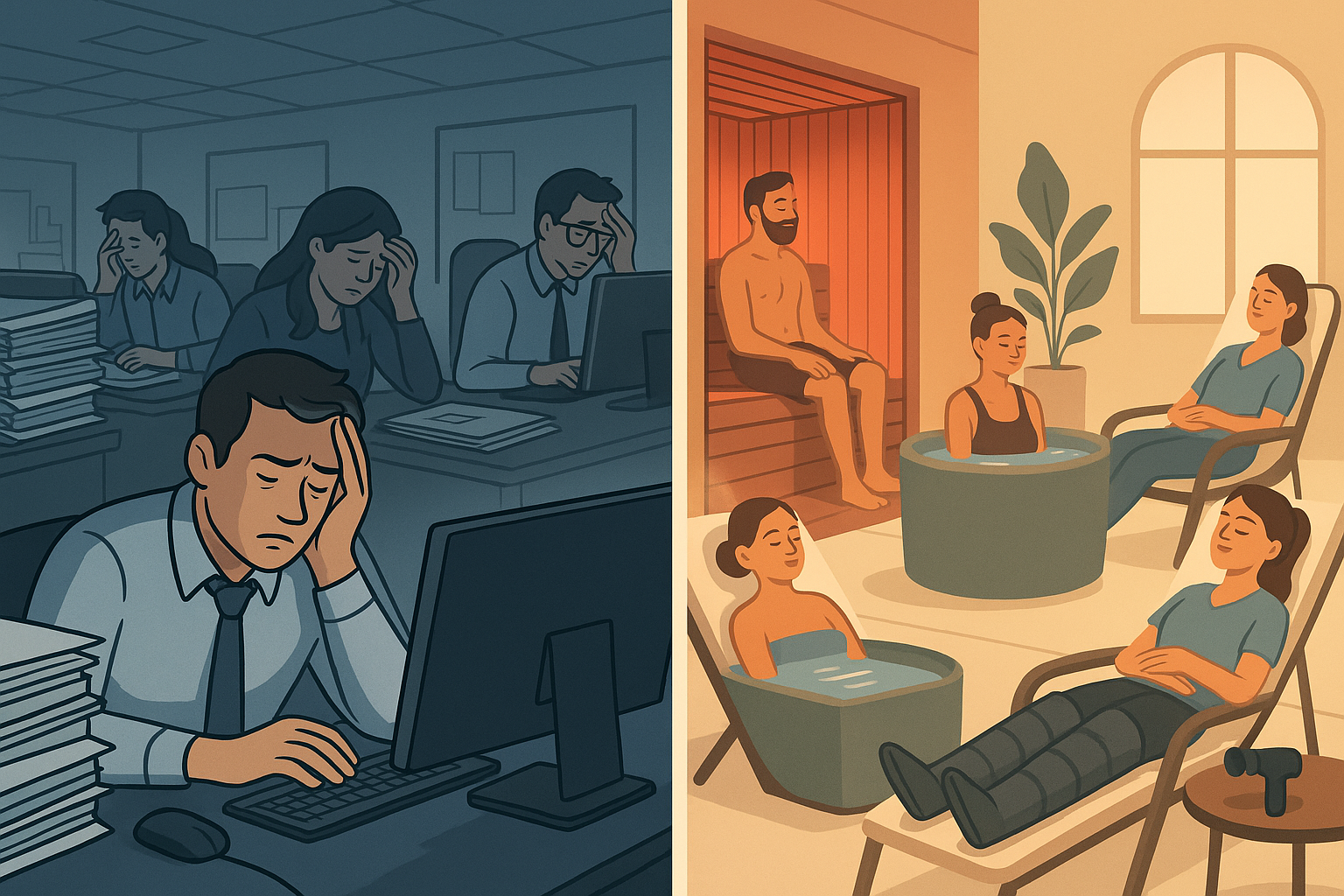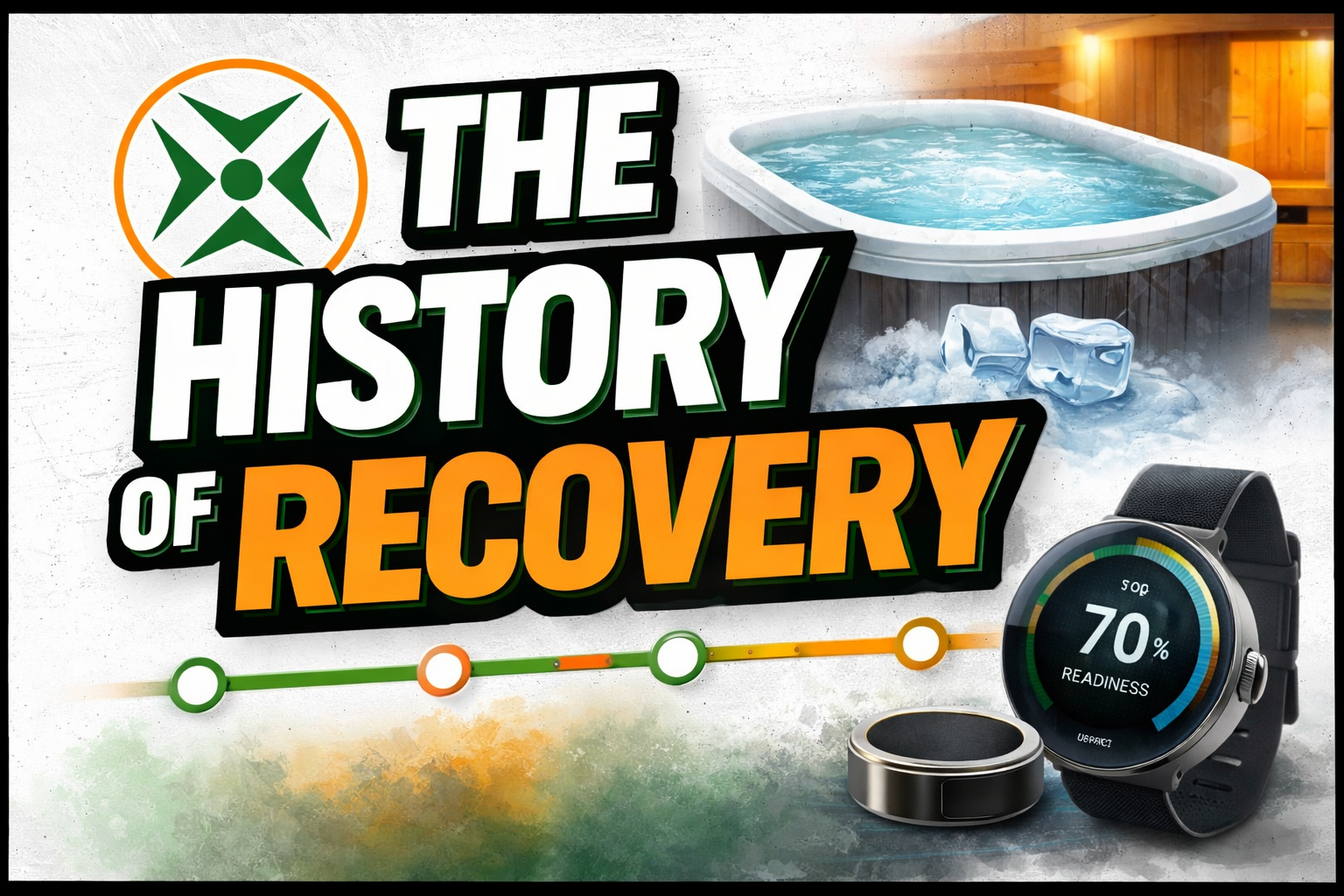Reclaiming Energy, Focus & Resilience: Why Recovery Belongs in Your Corporate Wellness Plan
Mike Collette • July 1, 2025
Improve Burn Out. Add Recovery.

In today’s fast-paced business world, your people are your edge—and they’re under pressure like never before. Between relentless digital demands, rising burnout rates, and a chronic lack of restorative time, employees aren’t just tired… they’re depleted.
According to a 2022 McKinsey Health Institute
global survey, one in four employees
is experiencing symptoms of burnout—ranging from emotional exhaustion to diminished motivation and cognitive function. Even more alarming, Gallup data shows that only 21% of employees are engaged at work globally, while 44% report experiencing daily stress,
making burnout one of the greatest threats to workplace performance and retention today.
But what if the solution wasn’t another webinar or step-counting challenge?
What if it was a chance to slow down, recharge deeply, and return stronger—physically, mentally, and emotionally?
🔁 Recovery Is the Missing Link in Corporate Wellness
Most wellness programs focus on productivity—but recovery is what fuels it.
We now understand that without adequate recovery, the body stays in a prolonged state of sympathetic overdrive—contributing to chronic stress, inflammation, poor sleep, and decreased decision-making ability. Your organization’s edge lies in how well your people can restore, not just perform.
Recovery practices offer measurable outcomes across three key dimensions:
🔋 Energy Restoration: Infrared & Red Light Therapy
Research published in Lasers in Medical Science shows that photobiomodulation (red and near-infrared light therapy)
can improve mitochondrial function, reduce oxidative stress, and accelerate muscle recovery post-fatigue. It has also been shown to support improved sleep quality, which is directly tied to focus, mood, and workplace performance.
🧠 Cognitive Clarity: Cold Plunge & Breathwork
Cold-water immersion, especially at temperatures of 50-59°F, triggers norepinephrine release, which enhances alertness, focus, and mood. A 2023 systematic review in PLOS One found that cold exposure significantly reduces markers of systemic inflammation and improves stress resilience
and brain function
when practiced consistently.
Additionally, slow-paced breathwork (especially nasal or diaphragmatic breathing) has been proven to shift the body into parasympathetic tone and reduce cortisol levels within minutes.
❤️ Emotional Resilience: Compression, Quiet, & Mobility
Compression therapy, such as pneumatic compression (e.g., Normatec), improves circulation, accelerates recovery from fatigue, and is associated with reduced delayed-onset muscle soreness (DOMS) according to Journal of Strength and Conditioning Research.
Equally important is the space to decompress.
Studies in Occupational Health Psychology show that scheduled recovery breaks—especially those involving physical relaxation or mindfulness—enhance emotional regulation, resilience, and long-term well-being.
Burnout isn't about working too hard—it's about recovering too little.
🧊🔥 What We Offer
We’ve built a state-of-the-art recovery space designed to serve both high-performers and everyday professionals alike. Tools include:
- Infrared & Red Light Sauna
- Cold Plunge Therapy
- Normatec Compression Recovery
- Guided Breathwork & Mindfulness Tools
- Mobility Zones & Massage Guns
- BFR (Blood Flow Restriction) Cuffs for Recovery Training
Whether your team is training for a marathon—or just trying to survive another Zoom quarter—these science-backed modalities are proven to help people feel better, think clearer, and perform at a higher level.
📈 Real Benefits for Your Business
Incorporating recovery isn’t just good for people—it’s good for your bottom line.
💼 Companies investing in employee well-being programs see a 5:1 to 11:1 ROI, according to the Harvard Business Review. And organizations that actively support recovery protocols show:
- Lower absenteeism & burnout rates
- Higher productivity per hour worked
- Improved cognitive performance & executive function
- Enhanced team morale, retention & engagement
- Reduced healthcare costs over time
Even 1–2 recovery sessions per month
can significantly reduce chronic stress markers like cortisol, according to a meta-analysis published in Frontiers in Psychology.
🏢 Corporate Wellness Demo Day: Let Your Team Experience It
Want to see what recovery looks like in action?
We're inviting local businesses to book a Corporate Wellness Demo Day at our facility:
✅ Exclusive access to our recovery space
✅ Hands-on experience with tools like red light, sauna, and cold plunge
✅ A guided walkthrough by our expert staff
✅ Insight into scalable wellness integrations for your organization
✅ Optional biometric testing or recovery tracking
Whether you're testing the waters or ready to roll out a new wellness strategy, this no-obligation session is a powerful starting point.
📩 Let’s Build a Healthier, More Resilient Workforce—Together
Your team doesn’t need another wellness email—they need real recovery.
Let’s help them bounce back better, think clearer, and lead stronger.
To schedule your Corporate Wellness Demo Day, contact CEO/Founder Mike Collette directly: Mike@prototypetraining.com
📚 References
McKinsey Health Institute. (2022). Addressing Employee Burnout and Resilience Globally.
Gallup. (2023). State of the Global Workplace Report.
Andersson, M., et al. (2017). Photobiomodulation improves cognitive performance and sleep quality. Lasers in Medical Science.
Bleakley, C.M., & Davison, G.W. (2010). What is the biochemical and physiological rationale for using cold-water immersion in sports recovery? British Journal of Sports Medicine.
Tipton, M.J., et al. (2017). Cold-water immersion: kill or cure? Experimental Physiology.
Zaccaro, A., et al. (2018). How breath-control can change your life: A systematic review on psychophysiological correlates of slow breathing. Frontiers in Human Neuroscience.
Gibbons, M.J., et al. (2021). Compression Therapy for Recovery. Journal of Strength and Conditioning Research.
Bennett, A.A., et al. (2018). Psychological detachment from work during off-job time: Predictive role of recovery experiences. Journal of Occupational Health Psychology.
Zhang, Y., et al. (2021). Workplace well-being programs and chronic stress markers: A meta-analysis. Frontiers in Psychology.
Harvard Business Review. (2021). The ROI of Employee Well-being Programs.
Previous Blogs

Sharang is a standout part of the Prototype community—steady, positive, and always putting in the work—and his commitment to consistency, camaraderie, and long-term progress makes him a perfect example of what PTS is all about. Below he answers some questions and shares his experience. Share your experience at Prototype—favorite memories, moments, or stories or what’s your favorite part/what do you look forward to? What stands out most about Prototype is the camaraderie. The members, especially in the 7AM and Noon classes, create a great balance of fun and focus. Everyone is friendly and supportive, but when it’s time to work, people take the WODs seriously and push themselves to improve. That combination can be hard to find. All the coaches play a huge role in setting that tone. My favorite moments are the everyday ones i.e. showing up, putting in the work together, leaving class feeling accomplished. What I look forward to most is continuing to train alongside people who genuinely enjoy the process and want to get better. “Because summer’s coming.” Who at Prototype has made the biggest impact on you and why? As a dad of two young daughters, the people who’ve made the biggest impact on me at Prototype are the women in the gym. They all train with confidence, strength, consistency and set a powerful example. It’s the kind of environment I hope my daughters grow up seeing where strength is normal and earned. What are your hobbies and activities outside the gym? I dabble a bit in photography, star gazing and love to travel. Playing atrocious golf. How has Prototype helped you or solved a problem for you? Prototype has helped me stay active. There’s a real sense of happiness and accomplishment after each workout, and that feeling has become addictive in the best way. Knowing I’ll leave class feeling stronger, physically and mentally, keeps me coming back. Prototype has turned working out from something I should do into something I genuinely want to do, which has made a huge difference in maintaining a sustainable fitness routine. What are your current fitness goals? Steady progress and longevity. If I can keep lifting, moving well, and feeling good years from now, I’ll consider that a win. I hope my future self will thank my present self. Favorite Quote If you can’t explain it simply you don't understand it well enough.

Greg is an amazing part of our community — consistent, encouraging, and ready to get after it. He truly represents what the PTS community is all about. Prototype of the Month is well deserved! Below, he answers a few questions about his time at PTS. Share your experience at Prototype—favorite memories, moments, or stories or what’s your favorite part/what do you look forward to? I definitely look forward to that feeling of clarity after finishing up a workout. I feel ready to tackle the rest of the day. Sometimes I have trouble getting mentally ready for a tough looking metcon, but I always feel better afterwards. Who at Prototype has made the biggest impact on you and why? All the coaches and members are great, I look forward to seeing everyone when I am there, but the person who has made the biggest impact is Bridget Owens. She is my motivation and always pushes me to keep going and push myself to get better. What are your hobbies and activities outside the gym? I love cycling and mountain biking, the workouts at prototype have definitely helped improve my fitness so that I can do better on the bike even though I don’t get out as often as I would like. Also spending time with my family, grilling and BBQing when the weather is nice and getting to the beach in the summer. How has Prototype helped you or solved a problem for you? Prototype has helped enormously with my level of anxiety, I was really struggling when we first moved into town, the community and workouts at Prototype have been a life saver for my mental health. What are your current fitness goals? I want to get better at gymnastics, maybe get some toes to the bar. Favorite Quote Two Quotes: “Bone on bone, stack it” -Jon “Activate the lower half” -Brian
Climb to New Heights
Prototype Training Systems is more than a gym - it is a lifestyle. Join us today!


